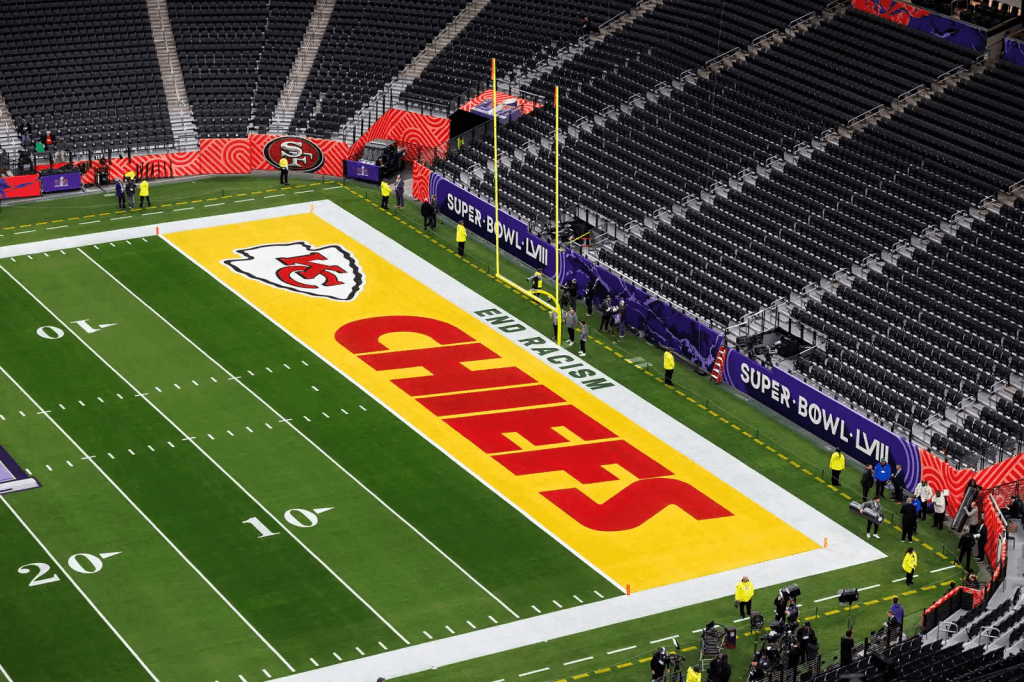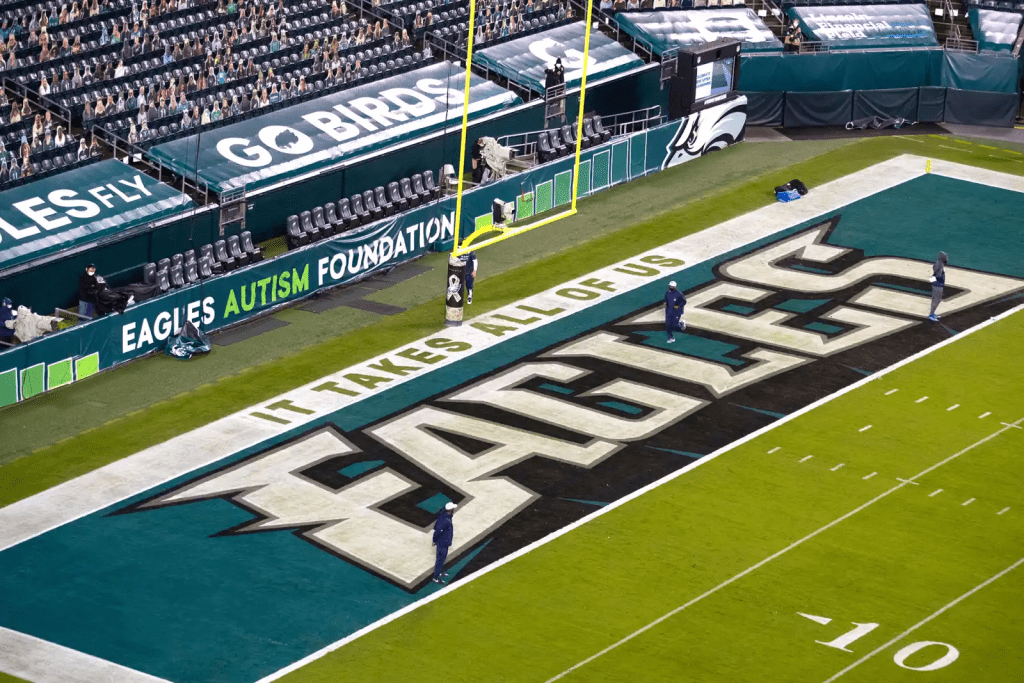The NFL is making a noticeable shift in its messaging for Super Bowl LIX between the Kansas City Chiefs and the Philadelphia Eagles. For the first time since 2021, the phrase “End Racism” will not appear in the end zones at the championship game. Instead, the league has opted for “Choose Love” and “It Takes All of Us” as the featured end zone slogans at New Orleans’ Caesars Superdome.
This change has sparked conversations across the sports world, raising questions about the NFL’s commitment to social justice, its motivations, and what this decision signifies in the broader cultural landscape.

Why Is the NFL Removing ‘End Racism’ from the End Zones?
The NFL introduced social justice slogans on the field in 2020, during a time of heightened racial tension in the U.S. Following the murder of George Floyd and the rise of the Black Lives Matter movement, the league embraced messages like “End Racism,” “Stop Hate,” and “It Takes All of Us” as part of its Inspire Change initiative.
Now, the decision to remove ‘End Racism’ from the Super Bowl end zones signals a notable shift. According to NFL spokesperson Brian McCarthy, the change reflects recent events and aims to provide a message of unity and resilience.
“We felt it was an appropriate statement for what the country has collectively endured, given recent tragedies, and can serve as an inspiration,” McCarthy told The Athletic.
The tragedies he referenced include the January terror attack in New Orleans’ French Quarter and the recent plane crash over Washington, D.C.. The league appears to be shifting toward a broader message of healing and solidarity rather than focusing explicitly on racial justice.
A New Era for the NFL’s Social Justice Messaging?
Since 2018, the NFL has actively engaged in social justice initiatives, investing in programs that promote equity and opportunity—particularly in underrepresented communities. The Inspire Change program, which was launched in response to ongoing concerns about racial inequality, provided funding for educational programs, police-community relations efforts, and economic advancements.
However, as public attitudes evolve, the league appears to be recalibrating its approach. Instead of explicitly addressing racism, the focus now seems to be on messages of unity and inclusivity.
The new end zone phrases, “Choose Love” and “It Takes All of Us,” align with the league’s ongoing commitment to promoting positive change but avoid the direct confrontation of systemic racism that “End Racism” represented.
Does This Change Align with Political Shifts?
The timing of the decision has led to speculation about whether the NFL is reacting to political and cultural pressures.
🔹 President Donald Trump’s attendance at the Super Bowl has been a major headline leading up to the game. Trump, who recently issued an executive order eliminating federal Diversity, Equity, and Inclusion (DEI) programs, has been a vocal critic of social justice movements in professional sports. His presence at the game has led some to question whether the league is subtly adjusting its stance in response to shifting political winds.
🔹 NFL Commissioner Roger Goodell, however, maintains that the league remains committed to diversity and inclusion efforts. In a statement earlier this week, he reaffirmed that the league’s social justice initiatives are not dictated by trends but by a long-term commitment to equality.
“We got into diversity efforts because we felt it was the right thing for the National Football League and we’re going to continue those efforts,” Goodell said. “We’re not in this because it’s a trend to get in or a trend to get out of it.”
That said, the removal of ‘End Racism’ from the Super Bowl end zones suggests that the league is strategically shifting its language to be less polarizing while still promoting unity.

Reactions from Fans, Players, and Analysts
The decision has received mixed reactions, with fans, analysts, and players divided on what it represents.
✅ Supporters of the change argue that the NFL is adopting a more unifying message. They believe that “Choose Love” and “It Takes All of Us” are less divisive and can appeal to a broader audience without alienating any particular group.
❌ Critics, however, see it as a step backward. They argue that removing ‘End Racism’ sends the message that the NFL is scaling back its commitment to racial justice efforts. Some believe this could be a response to pressure from conservative audiences who have criticized the league’s involvement in social activism.
🏈 Current and former NFL players have also weighed in. Some players have expressed disappointment, feeling that the league is backing away from a powerful message that resonated with many communities. Others have emphasized that actions speak louder than words and that the NFL’s financial and structural commitments to equity are more important than on-field slogans.
What This Means for the Future of the NFL’s Social Initiatives
The removal of ‘End Racism’ from the Super Bowl end zones does not necessarily mean the NFL is abandoning its social justice efforts. Instead, it may indicate a more nuanced approach—one that prioritizes unity over direct political messaging.
However, this decision does raise important questions about how the league will handle social justice topics moving forward.
🔹 Will the Inspire Change initiative continue to receive strong support from the NFL?
🔹 Will players be encouraged to speak out on social issues, or will the league subtly discourage activism?
🔹 Is this a temporary change, or is it part of a broader shift in the NFL’s messaging strategy?
For now, the league appears to be walking a fine line—maintaining its public commitment to diversity and inclusion while adjusting its visible messaging in response to evolving social and political landscapes.
Final Thoughts: A Pivotal Moment for the NFL
As the Kansas City Chiefs and Philadelphia Eagles take the field for Super Bowl LIX, the removal of ‘End Racism’ from the end zones will likely go unnoticed by casual viewers. However, for those who have followed the NFL’s social justice journey, this change represents a significant moment.
Is the league softening its stance in response to external pressures, or is this simply an evolution of its messaging strategy? Either way, the decision has reignited debate about the role of social justice in professional sports and how the NFL balances activism with maintaining a broad fan base.
Whether this is the start of a larger shift in the NFL’s approach or just a one-time messaging adjustment, one thing is clear—the league’s actions moving forward will be watched closely by fans, players, and analysts alike.